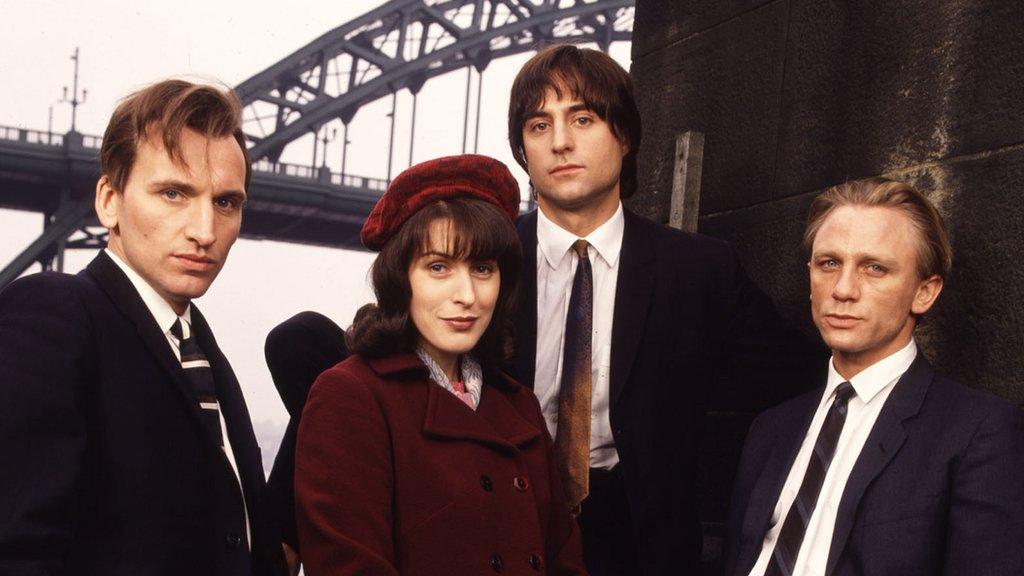Manchester builds up its culture scene with £25m Home
- Published
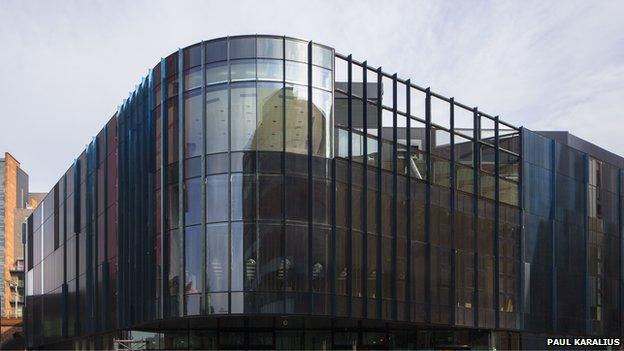
The new Home venue includes two theatres, five cinemas and an art gallery
Manchester's new £25m arts centre Home is billed as the city's answer to the Barbican or Southbank Centre. With big money also being spent on other venues in the city, is Manchester on course to become a cultural powerhouse to rival London?
The large curved glass wedge that has appeared opposite the site of the old Hacienda nightclub, and which will later have its opening ceremony - led by London 2012 supremo Danny Boyle - is the latest evidence of a mini building boom in Manchester's cultural scene.
The wedge - which contains two theatres, five cinemas, an art gallery - replaces the much-loved Cornerhouse cinema and gallery and Library Theatre, which have merged and been given an upgrade in the process.
Home's launch comes three months after the Whitworth gallery reopened after a £19m expansion, while there are also plans for another new £78m venue called The Factory, less than a mile from Home. Austerity? What austerity?
If it happens, The Factory will be a 5,000-capacity permanent home for the Manchester International Festival.
These projects, taken with the city's existing activities, seem to have given Manchester optimism that its cultural future can be as bright as its illustrious past.
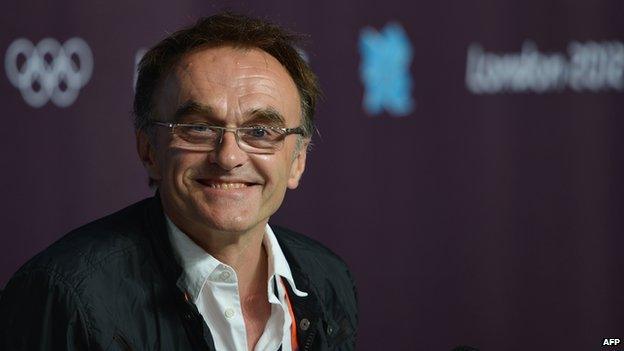
Danny Boyle is a patron of Home and will officially open the venue on 21 May
At Home, chief executive Dave Moutrey is relishing having a custom-built venue to replace the Cornerhouse.
He boasts that they now have ample toilets and enthuses about the outdoor cafe seating (weather permitting) and smoother layout.
"It's going to be quite a novel experience for our customers to be able to read the subtitles on a film without having to dodge somebody's head," he says.
As well as improving the facilities, Home will provide more space to cater for what Moutrey describes as Manchester's "hunger for new ideas".
The theatre, visual art and film offerings will all be roughly on the same wavelength - contemporary, intelligent, with a strong international flavour but with roots in Manchester.
The opening line-up gives a taste of what to expect.
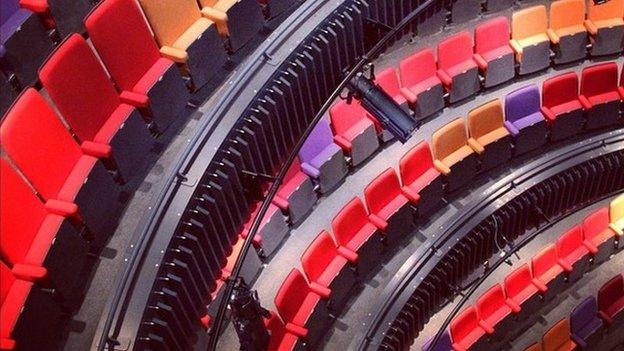
The venue's main theatre has 450 seats
Stockport playwright Simon Stephens - who put The Curious Incident of the Dog in the Night-Time on stage for the National Theatre - has adapted Hungarian writer Odon von Horvath's 1932 play Kasimir and Karoline and renamed it The Funfair.
The play has also inspired the opening art exhibition, which features artists from Egypt, Iceland and Kosovo as well as Manchester.
And there will be inventive screenings of funfair-themed films like Big, Carnival of Souls and Freaks.
"There is no superior art form here," Moutrey says. "There's no art form that calls the shots over the others. They're all in dialogue with each other."
Home may be a culture vulture's dream, but it was conceived by Manchester City Council in the hope that it would boost the economy by attracting other businesses to its part of the city centre.
Now, Moutrey points out restaurants, a hotel and offices that he says would not have moved in if Home were not there.
"I think we're an example for how arts can be a catalyst for regeneration and people wanting to come and live and work in a city," he says.
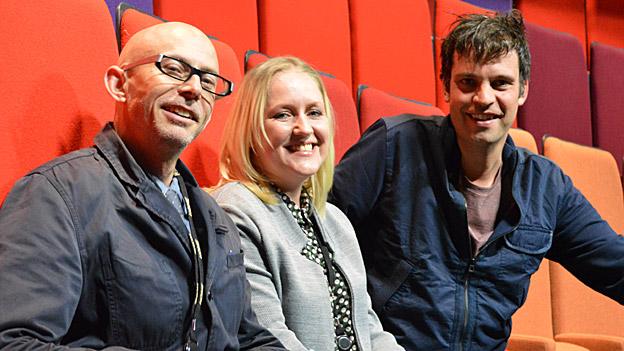
Jason Wood, Sarah Perks and Walter Meierjohann are the artistic directors of the new venue
The tactic has already worked on one person - the organisation's new artistic director for film, Jason Wood, who has moved from Curzon Cinemas in London.
Wood says he moved because the independent film scene in the capital was becoming "quite stagnant".
"I was looking at a lot of the activity that was going on in Manchester - just the funding, the excitement, and the notion of a city in a really good space culturally," he says.
"That was something that was really exciting and something I was happy to respond to.
"I really was beginning to feel that London was becoming the second city in terms of how it responded to film culture. I was finding it was becoming more and more difficult to get audiences to come."
Home's artistic director of theatre, Walter Meierjohann, has also arrived from London, where he worked for three years at the in-form Young Vic.
He is originally from Germany, where a more federal system exists, he explains. "So the idea that in a country you can have five or six big cities... you can say Berlin, Hamburg, Frankfurt, Munich are all on an equal level culturally, which they are, [and that] is a good thing.
"I still think London will always be number one, but I think Manchester's on a really good journey."
'The new Barcelona'
Other UK cities have also seen recent cultural developments - Birmingham has its library, Liverpool has the new Everyman theatre, and a new arts centre in Bangor, north Wales, will cost twice as much as Home.
But still, the current expansion in Greater Manchester - coupled with its existing world-class venues - suggests it will have a critical mass of culture that other cities outside London cannot match.
And on top of that, it is being positioned as the de facto capital of the fabled "Northern Powerhouse" that the last government was so keen to promote.
Home's third artistic director is Sarah Perks, who is continuing the visual art work she did at Cornerhouse.
There is no need to compare Manchester with London, she says. "Manchester shouldn't look to become a mini-London or emulate London," she says.
"It's about becoming Manchester and being known for that, and looking acrossways and upwards. It doesn't always have to be this weird colonial relationship with London."
Dave Moutrey echoes that, describing the city as an "an alternative centre of gravity" rather than a rival to the capital.
He compares the relationship between Manchester and London with that of Barcelona and Madrid.
"If we continue to make great culture here I don't think it's too big a shock for people to start talking about Manchester in the same way as they talk about Barcelona," he says.
- Published10 April 2015

- Published2 April 2015
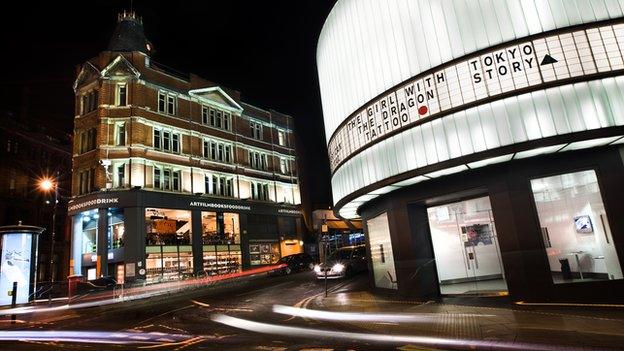
- Published15 December 2014
